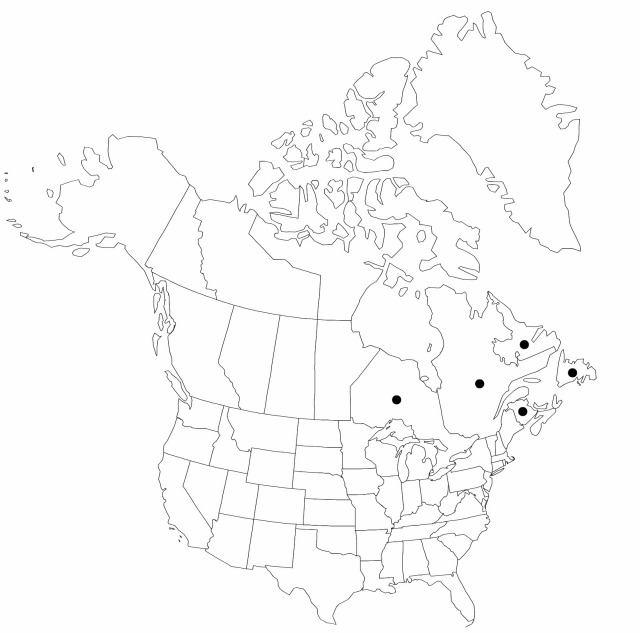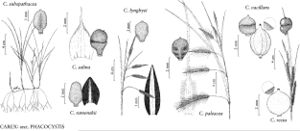Carex salina
Kongl. Vetensk. Acad. Nya Handl. 24: 165. 1803.
Plants not cespitose. Culms obtusely angled, 6–35 cm, glabrous. Leaves: basal sheaths brown; sheaths of proximal leaves glabrous, fronts lacking spots and veins, apex U-shaped; blades amphistomic, 2–3 mm wide, papillose on both surfaces. Proximal bract longer than inflorescence, 1.5–4 mm wide. Spikes erect; staminate 1–2; pistillate 2–4; proximal pistillate spike 1–3.1 cm × 2–5 mm, base cuneate. Pistillate scales brown, 2.5–8 × 1–1.7 mm (including awn), wider than perigynia, midvein reaching apex, 1/3–1/2 the width of scale, apex acute or acuminate, often aristate, awn glabrous or scabrous. Perigynia ascending, pale brown, incompletely 0–3-veined on each face, somewhat inflated, loosely enclosing achenes, ellipsoid, (2–)2.5–3.3 × 1.2–1.9 mm, dull, base with stipe to 0.2 mm, apex acute, short-papillose; beak cylindric to conic, 0.2–0.4 × 0.3–0.4 mm. Achenes deeply constricted on 1 face, apex truncate to retuse, glossy; style base bent, rarely straight. 2n = 77, 78, 79.
Phenology: Fruiting Jul–Sep.
Habitat: Saline or brackish shores
Elevation: 0–10 m
Distribution

N.B., Nfld. and Labr., Ont., Que., Eurasia.
Discussion
Carex salina is considered to be a stabilized hybrid between C. paleacea and C. subspathacea or a backcross with either of the parents (J. Cayouette and P. Morisset 1985, 1986; L. A. Standley 1990) and does not occur outside of the sympatric range of the parental species.
Reports of the species from Greenland are based on plants of Carex subspathacea or hybrids of C. nigra with C. subspathacea or C. lyngbyei. Previous records from northern Northwest Territories and northern Manitoba are based on plants of C. aquatilis, C. subspathacea, or their hybrid, and records from Alaska are based on either C. ramenskii or C. subspathacea. Backcrosses of C. salina with its parents occur: C. paleacea × C. salina; C. salina × C. aquatilis subsp. minor (= C. ×stansalina E. Lepage); C. salina × C. subspathacea.
Other verified and accepted hybrids are: Carex ×subsalina E. Lepage (= C. salina × C. aquatilis), C. neorigida E. Lepage (= C. salina × C. bigelowii), C. ×spiculosa Fries (= C. salina × C. bigelowii), C. ×mendica E. Lepage (= C. salina × C. recta), and C. ×stansalina E. Lepage (= C. salina × C. aquatilis).
Selected References
None.
